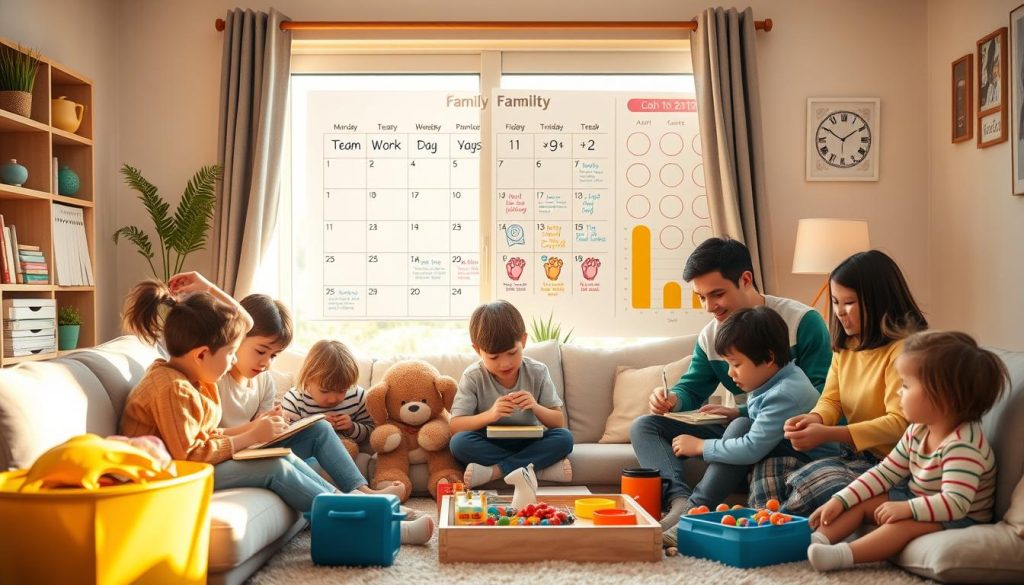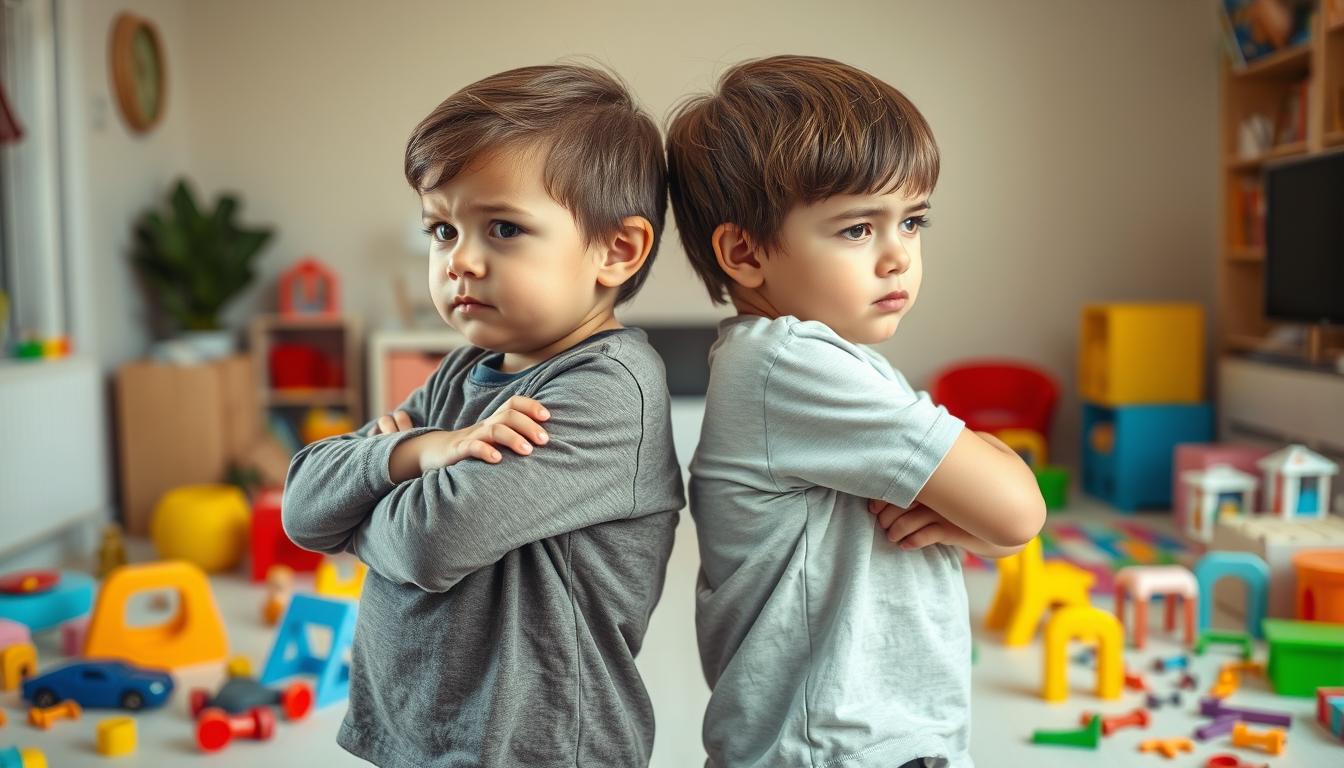Are sibling clashes leaving you feeling bewildered and ineffective? Despite all your efforts, it’s common to face sibling rivalry. This can disrupt the peaceful household you’re trying to create. You might wonder why your kids can’t just get along and how to fix this issue.
This article will explore effective parenting tips. We’ll look at gentle parenting strategies to help resolve sibling conflicts.
Key Takeaways
- Understand the root causes of sibling conflicts to address them effectively.
- Implement effective communication strategies to foster a cooperative family environment.
- Stay calm and composed to model positive behavior for your children.
- Teach empathy and respect to help siblings understand each other’s perspectives.
- Encourage positive interactions and activities that promote sibling bonding.
Understanding the Root Causes of Conflict Between Siblings
Sibling rivalry is a big challenge for parents. It’s shaped by many factors. Knowing these causes helps us tackle conflicts better. About 80% of siblings face rivalry, making it common in many homes.

Analyzing Common Triggers
Many things can start fights between siblings. How parents act is key, especially if they treat kids differently. For example, stepkids might feel left out or favored. Middle children often feel ignored, leading to rivalry.
Research shows that neglectful parenting can lead to more fights (r = 0.389). But, parents who are warm and consistent can reduce conflicts (r = -0.201).
The Role of Insecurity and Self-Doubt
Insecurity and self-doubt make sibling fights worse. Kids from divorced families often feel these feelings more. Remarriage can also cause jealousy and competition for attention.
These feelings can lead to kids acting out and excluding others. Over 60% of adults say they still have issues with their siblings from childhood. So, it’s important to deal with these problems early.
Impact of Anxiety on Children’s Behavior
Anxiety greatly affects how kids behave and can cause fights. Kids with anxiety might try to control things in bad ways. They might act bossy or push others away.
Studies show that kids in rivalries often feel stressed, have low self-esteem, and struggle with emotions. Knowing why kids behave this way helps parents find ways to reduce anxiety. This can lead to better relationships between siblings.
Effective Communication Strategies for Resolving Sibling Rivalry
Many parents turn to mental health experts to handle sibling fights. Gentle parenting and body positivity are key to solving these issues. It’s important to create a safe space where kids can share their feelings without fear of judgment.
How to Communicate Without Judgement
It’s crucial to avoid criticism when dealing with sibling rivalry. This builds trust and lets kids speak freely. Gentle parenting focuses on empathy and understanding, which is essential here.
Using Objective Storytelling
Objective storytelling tells events without bias. It helps kids see things clearly, reducing fights. This method also teaches them to accept different views, which is vital for body positivity.
Asking Questions to Promote Reflection
Helping kids think about their actions can change things. Open-ended questions guide them to see how their behavior affects others. These talks can also cover topics like puberty, boosting their emotional smarts.

If problems still exist, online family therapy can help. It offers a place for everyone to be heard and respected. Using these strategies, parents can make their homes more peaceful and loving.
Managing Parenting Challenges When Siblings Don’t Get Along
Handling sibling fights needs a careful plan. Here are tips to help you deal with these issues calmly and well.
Remaining Calm and Composed
Parents often act as referees, not coaches. Staying calm is key to solving fights. It shows your kids how to control their feelings, which is part of gentle parenting.
Try deep breathing or taking a short break to calm down. This helps you come back to the situation with a clear mind.

Teaching Empathy and Respect
Teaching empathy and respect is a great way to handle sibling fights. It makes everyone understand and respect each other’s feelings. Role-playing and talking about feelings can teach empathy.
Also, teach kids about consent. Explain how respecting each other’s space shows respect and care.
Promoting Positive Interactions
It’s important to encourage good interactions between siblings. Positive reinforcement works well, like ignoring bad behavior and rewarding good ones. Use tools like timers for younger kids and contracts for older ones to set clear rules.
Also, make sure everyone gets a turn and understand what’s fair. This helps manage feelings of unfairness.
Most parents face sibling rivalry, and over 60% struggle to enforce rules. But, focusing on shared activities and teamwork can help. Regular family talks and activities can also build a cooperative atmosphere.
In short, these strategies can help with immediate fights and helping kids with anxiety from family issues. By practicing gentle parenting, you can create lasting peace and support your kids’ emotional growth.
Preventive Measures for Long-Term Harmony
Keeping siblings in harmony is all about creating a supportive family. By taking steps early on, we can avoid future fights. This way, siblings learn to work together and strengthen their bond.

Creating a Collaborative Environment
Teaching kids to work together is key. Family projects help them understand teamwork. They learn about money and sharing resources through budgeting.
Also, controlling kids screen time is important. It lets them spend time together doing fun, eco-friendly activities like gardening.
Encouraging Individual Interests
It’s also important to let each child shine in their own way. Activities they love, like sports, help them grow. This reduces jealousy and makes everyone happy.
When we support their interests, they feel special. This makes our home a place of balance and peace.
Conclusion
Understanding the reasons behind sibling fights is key. Knowing about insecurity, anxiety, and what triggers these helps. It lets you deal with these issues with kindness and understanding.
Talking things out is very important. Using stories and asking questions helps siblings get along better. This way, you can solve problems and keep peace in the family.
Good parenting is also vital. Stay calm, teach kids to feel for others, and encourage them to get along. By supporting their interests and teamwork, you can lessen fights and build a strong family bond.
It’s also important to watch out for bigger issues. Things like eating disorders in kids, keeping them safe online, and taking care of mom’s mental health matter a lot. These help make a healthy family environment.
Studies show that parents, especially dads, greatly influence kids. They shape their behavior and happiness. Working with parents and supporting them is key to helping kids avoid problems like depression and anxiety.
By understanding these complex issues, you can make your home a safe and loving place. This is crucial for your family’s well-being.
FAQ
How can I handle sibling rivalry effectively?
What are common triggers for sibling conflict?
How does anxiety impact my children’s behavior in conflicts?
What are some effective ways to communicate with my kids during conflicts?
How can I teach empathy and respect among siblings?
What are some preventive measures to ensure long-term sibling harmony?
How can I help a middle child who feels neglected?
How can I support my children after a divorce?
What strategies can I use to promote body positivity for kids?
This post contains affiliate links. If you click on a link and make a purchase, I may earn a small commission — at no extra cost to you. Thank you for supporting this blog and helping me keep the patterns free! Read the full Affiliate Disclosure & Transparency.
